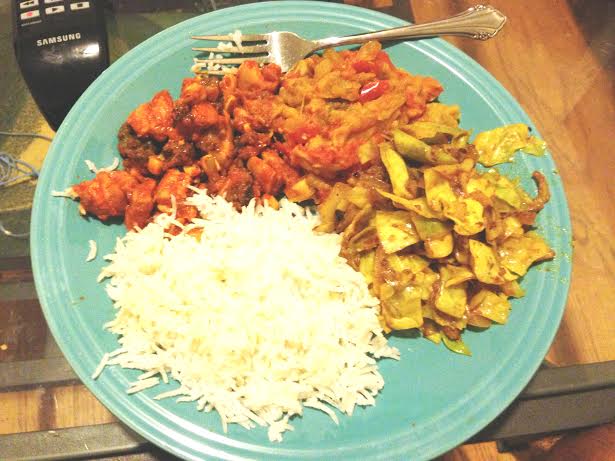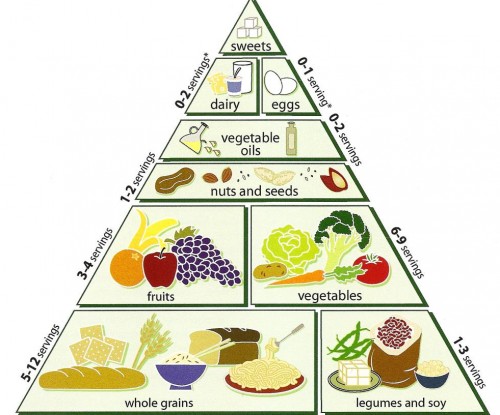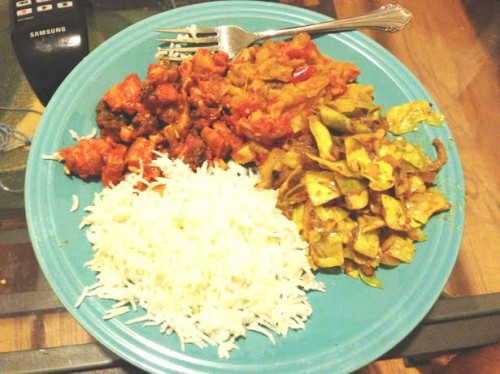
A Gujarati friend of mine g-chatted me from work informing me that she was “deficient in everything.” “Deficient in what?” I asked. She wasn’t sure of what her body was lacking in, so I went on and asked if she’s “deficient in iron and B12?”
“Yes and yes,” she said.
Since I am a nutritionist by trade, this conversation not only upset me because my best friend of 21 years never told me that she was having some preventable nutrition problems, but it also inspired me to make a list of ways to stay healthy on a vegetarian diet.
(1) Protein – Animal proteins are more bio-available and easily digested than vegetarian proteins. Thus, if you are vegetarian, make sure you are eating legumes, nuts or soy with every meal, to make sure you are getting in enough protein. If you are only eating vegetarian sources, you need a greater quantity of protein rich foods.

(2) Legumes – Includes lentils (daal), black beans, kidney beans and navy beans. Animal products are the only sources of complete proteins. What does this mean? Since amino acids make up proteins and there are 20 amino acids in total, a complete sources of protein comes from only animal products. Animal products have all the amino acids needed for the human body to function properly. Eating legumes only do not. Therefore, any legume or bean needs to be paired with food from the grain group, such as rice or bread, in order to form a complete protein.
(3) Dairy and/or eggs – For vegetarians, dairy and eggs are the only way to include vitamin B12 in their diet. Vitamin B12 is only found in animal products and is used in the body to create proteins and red blood cells. If you are a vegetarian who includes dairy or eggs in your diet, make sure you are getting these types of foods at least a few times a week to make sure that you are retaining some Vitamin B12. Dairy and eggs are also a great source of protein, so including these in your diet can help make sure you are getting enough protein as well!
(4) Iron – Iron is a common deficiency amongst vegetarians because iron is found in many animal products (excluding dairy). To make sure you are getting enough iron with a vegetarian diet, make sure you are eating legumes, nuts and eggs. These foods should be paired with vitamin C rich foods to aid in absorption (such as lemon, oranges, broccoli and other fruits and vegetables). Iron rich foods should not be eaten with calcium rich foods (like milk) because calcium can block iron absorption. Try to drink your milk or eat your yogurt between meals for vitamin B12 and make sure you are getting some other sources of vegetarian proteins at mealtime.
(5) Vitamin B12 supplements for vegans. Vegans often form deficiencies in Vitamin B12. If you have a completely vegan diet, you must supplement it with vitamin B12 supplements or you will develop a deficiency. Some symptoms of Vitamin B12 deficiency are weakness, tiredness, light-headedness, rapid heartbeat and breathing, pale skin, sore tongue, easy bruising or bleeding, including bleeding gums, stomach upset, weight loss, diarrhea or constipation. If a Vitamin B12 deficiency is not corrected, it can damage nerve cells and lead to permanent changes.

Example of a Balanced Vegetarian Indian Plate:
(This is a good example of what I would eat at my Oriya household)
1 cup daal
2/3 cup brown rice
1 cup of Bhaigan Bharta (Eggplant)
1 cup of Raita (Yogurt)
1 cup of Cauliflower
1 cup of Squash




